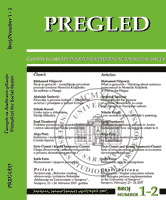Osjećanje krivice i kajanja planera i izvršitelja genocida
The feelings of guilt of genocide planers and perpetrators
Author(s): Ismet DizdarevićSubject(s): Psychology
Published by: Univerzitet u Sarajevu
Keywords: genocide; genocidal behavior; victim; obedience; individual responsibility; remorse; feelings of guilt; judgment
Summary/Abstract: During World War Two, German fascists have committed genocide against non-Germans, especially the Jewish population. Many innocent people have been displaced; many have also been shot, hung or burned to death. During the aggression against the Republic of Bosnia and Herzegovina a most horrific genocide was committed against the Bosniak population. Serb nationalists have mercilessly tortured and killed Bosniaks in jails and concentration camps. For planners and perpetrators of genocide, Bosniaks were only guilty of being what they always were: Bosniaks and Muslims in their religious beliefs. In this work, testimonies and behavior of those war criminals who were put to trial in Nurnberg in 1945 and now in Hague, is being analyzed. When comparing the testimonies of German planners and genocide perpetrators with Serb ones, one can not find significant differences. Most criminals do not display any kind of remorse or guilt for the crimes they had committed. They even think that they can not be blamed, since they do not consider their actions crimes, but righteous deeds. They have only, as they say, defended the Serb people from the Turkish attacks. In this work, the importance of feelings of guilt and remorse of war criminals as a pre-condition for forgiveness of victims is shown. It is possible to expect forgiveness only if planners and perpetrators of genocide sincerely repent and if they show this remorse publicly and ask for forgiveness. In cases where a display of remorse took place and forgiveness was asked for, it is 214 possible to expect it, but for deep genocidal wounds, forgiveness is not realistic, neither is it psychologically possible.
Journal: PREGLED - časopis za društvena pitanja
- Issue Year: XLVIII/2007
- Issue No: 1-2
- Page Range: 213-244
- Page Count: 32
- Language: Bosnian

